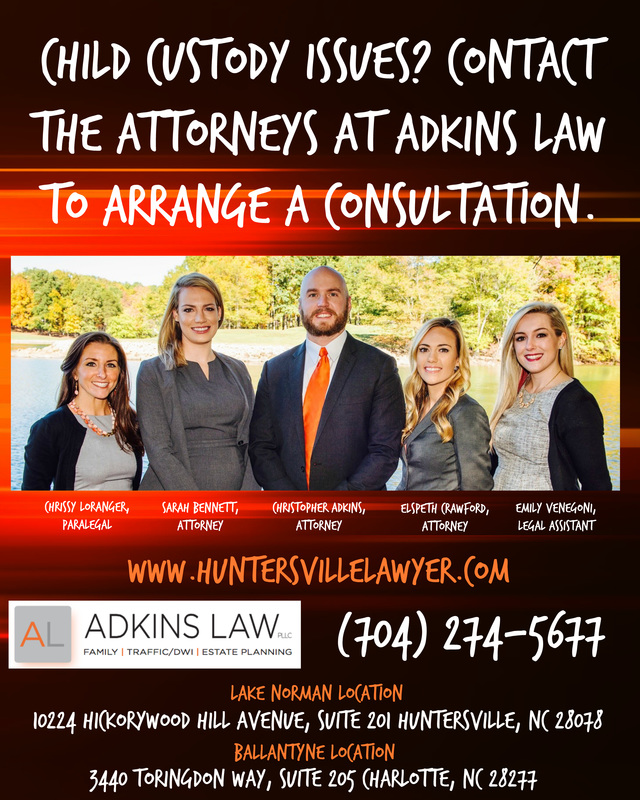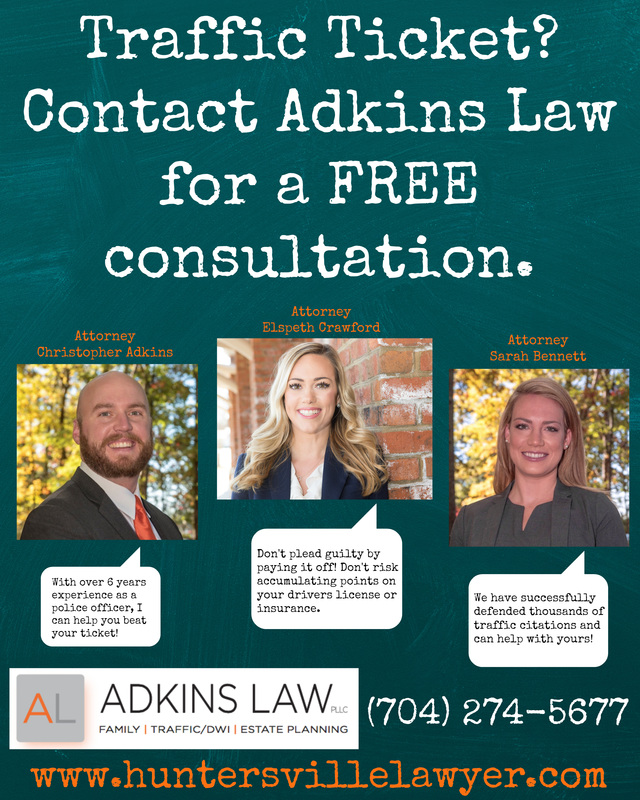|
Need assistance with child custody issues? Contact Adkins Law to arrange a consultation with Huntersville family law attorney. One of our Huntersville divorce attorneys can arrange a meeting with you to discuss your options.
3 Comments
Do you need a will or custom estate plan? Contact Adkins Law to arrange a free estate planning consultation with a Huntersville estate planning attorney. One of our Huntersville estate planning lawyers can help you create a will, trust, power of attorney, and living will suited to your specific needs. Need assistance with a traffic citation? Contact Adkins Law for a free traffic consultation with a Huntersville traffic attorney. One of our Huntersville traffic lawyers will arrange a traffic ticket consultation with you to discuss your options.  The Health Insurance Portability and Accountability Act of 1996 ("HIPAA") governs, in part, the disclosure of protected health information. HIPPA potentially creates issues for health care agents in that it prohibits the disclosure of protected health information until such agent is acting. Similarly, a patient's family may not receive protected health information without that patient issuing a HIPAA authorization or release authorizing the disclosure. The principal may limit the type of information released and revoke the authorization at any time. Without having a HIPAA authorization on file with the health care provider, the patient's agent, family, friends, and others involved in his or her care, or payment for care, may not receive protected information. If you would like to meet with an estate planning attorney to discuss HIPAA, health care agents, and living wills, contact Adkins Law to arrange a free estate planning consultation. Adkins Law has locations in Huntersville and Ballantyne. Adkins Law provides family law legal services for those needing legal assistance with separation, divorce, child custody, child support, and the division of marital property and debt. Adkins Law has locations in Huntersville and Ballantyne to best suit your needs. Contact Adkins Law to arrange a consultation.
A sound estate plan will help guarantee your family's safety and wellbeing. Contact Adkins Law to arrange an estate planning consultation at no charge with a Huntersville wills and estates attorney. One of our Huntersville estate planning lawyers will arrange to meet with you to discuss your will, trust, power of attorney, and living will.
 By Christopher Adkins In North Carolina, under NCGS 48-5-101, any adult may adopt another adult, but spouses may not adopt each other. Adult adoption may be for a number of reasons including a transfer of inheritance rights, the recognition of a close relationship, or the potential benefits the adoptee may qualify for (ex. medical insurance, immigration status). North Carolina defines an adult as an individual who is 18 years of age, or if under 18 years of age, is either married, or has been legally emancipated. To petition for an adult adoption in North Carolina, the parties must file the following paperwork:
Additionally, NCGS 48-2-605 requires that the adoptive parent and adoptee both appear in person, unless the court waives this requirement for cause. If the appearance is waived, an attorney (with written authorization) must appear for either or both parties. At least 30 days must have elapsed from the filing of the adoption petition (unless waived by the clerk), but notice of the petition must have been served on all necessary persons. If you are interested in an adult adoption and need to speak with an adoption attorney, contact Adkins Law. Adkins Law has locations in Huntersville and Ballantyne, and primarily serves Mecklenburg County, Charlotte, and the Lake Norman area.  By Christopher Adkins If the police want to stop a vehicle, most times they can find a reason. This may require them following you for a while, but they usually can find a reason. Whether this reason constitutes reasonable suspicion to justify the stop is another matter. To legally initiate a traffic stop, the police must have at least reasonable suspicion. Some people refer to this as reasonable, articulable suspicion or just simply “RS.” While the police may have probable cause to stop you, which is a higher standard than reasonable suspicion, all that is required to justify the stop is reasonable suspicion. If the police lack reasonable suspicion to initiate the traffic stop, any evidence seized or arrest made pursuant to the stop is unconstitutional. License Plate / Tag When a police officer is behind you in traffic, or even in the close vicinity of your vehicle, it is very possible that they are running your tag. Some police vehicles are even equipped with devices that check your plates automatically. It is kind of like fishing for a police officer: you run enough plates and eventually you are going to get a bite. North Carolina courts have ruled that because license plates are open to public view, a driver has no reasonable expectation of privacy in his plate, and thus a police officer may run your plate without reason. When the officer runs your plate, he enters it into the computer in his vehicle, which determines whether the license plate is current, matches the vehicle, and provides information concerning vehicle inspection. If anything is wrong with the vehicle, the officer is justified in conducting a traffic stop to further investigate. Based on the investigation, the officer may issue a citation or develop probable cause for an arrest. Drivers License Running a license tag will also give a police officer information on the registered owner of the vehicle. The officer is made aware of the license status of the registered owner and whether that person has any outstanding warrants or orders for arrest. By comparing the description of the registered owner provided by DMV to the description of the person driving the vehicle, the officer is justified in making a traffic stop. Upon investigation, if the driver is determined to be the registered owner with a defective drivers license or warrant, the officer may issue a citation or make an arrest. Traffic Violation If a police officer gets behind you and is looking for a reason to initiate a traffic stop, he will probably follow you for a while to see if you violate a traffic law. The officer is usually waiting for you to commit a common traffic violation such as changing lanes without signaling (if you aren't clear to do so), speeding (usually more than 5mph above the posted speed limit), or failing to come to a complete stop at a stop sign. According to the United States Supreme Court, even if the officer wants to make a stop based on a pre-textual basis, as long as the officer has reasonable suspicion to make the stop, the stop is valid. In other words, if an officer thinks you are driving while impaired and the true reason for his stop is to investigate the DWI, as long as he has some reasonable suspicion to make a traffic stop, the stop will be upheld as valid. Vehicle Equipment The big items an officer looks for here are window tint, improper display of tags and license plate stickers, and broken headlights or taillights. An officer may also look for such things as excessively loud mufflers or worn tires. If the officer wants to stop you, he will look hard to find a reason and a defect in your vehicle. Conclusion If a police officer wants to make a traffic stop on a vehicle, it is usually pretty easy for them to find a reason. The officer may have to follow you for a while, but the chances are that you won't be able to drive perfect forever. A lot of courts frown upon officers who follow citizens around looking for a reason to stop them. There is something un-American about following citizens around, interfering with their freedom of movement, and waiting for them to commit a traffic violation. The best thing you can do is ensure that your license, license plate, and vehicle are all valid, updated, and in good order before you drive. When an officer gets behind you and appears to be looking for a reason to initiate a traffic stop, do your best to obey all traffic laws and not to speed. You may want to pull over, park, and walk in a business if the officer appears to be obstructing your freedom of movement and making you nervous. Most police officers are good people and are looking out for your best interests. They're still quick to write you a citation and / or arrest you if they believe you've violated the law. Take precautions to protect yourself! If you need to speak with a criminal defense attorney, please contact Adkins Law for a free criminal defense consultation. Adkins Law has locations in Huntersville and Ballantyne for your convenience. |
Archives
January 2022
|
Lake Norman Location
9620 Sherrill Estates Road
Huntersville, North Carolina 28078
(704) 274-5677 main
(704) 231-5762 text
(877) 208-7577 fax
9620 Sherrill Estates Road
Huntersville, North Carolina 28078
(704) 274-5677 main
(704) 231-5762 text
(877) 208-7577 fax







